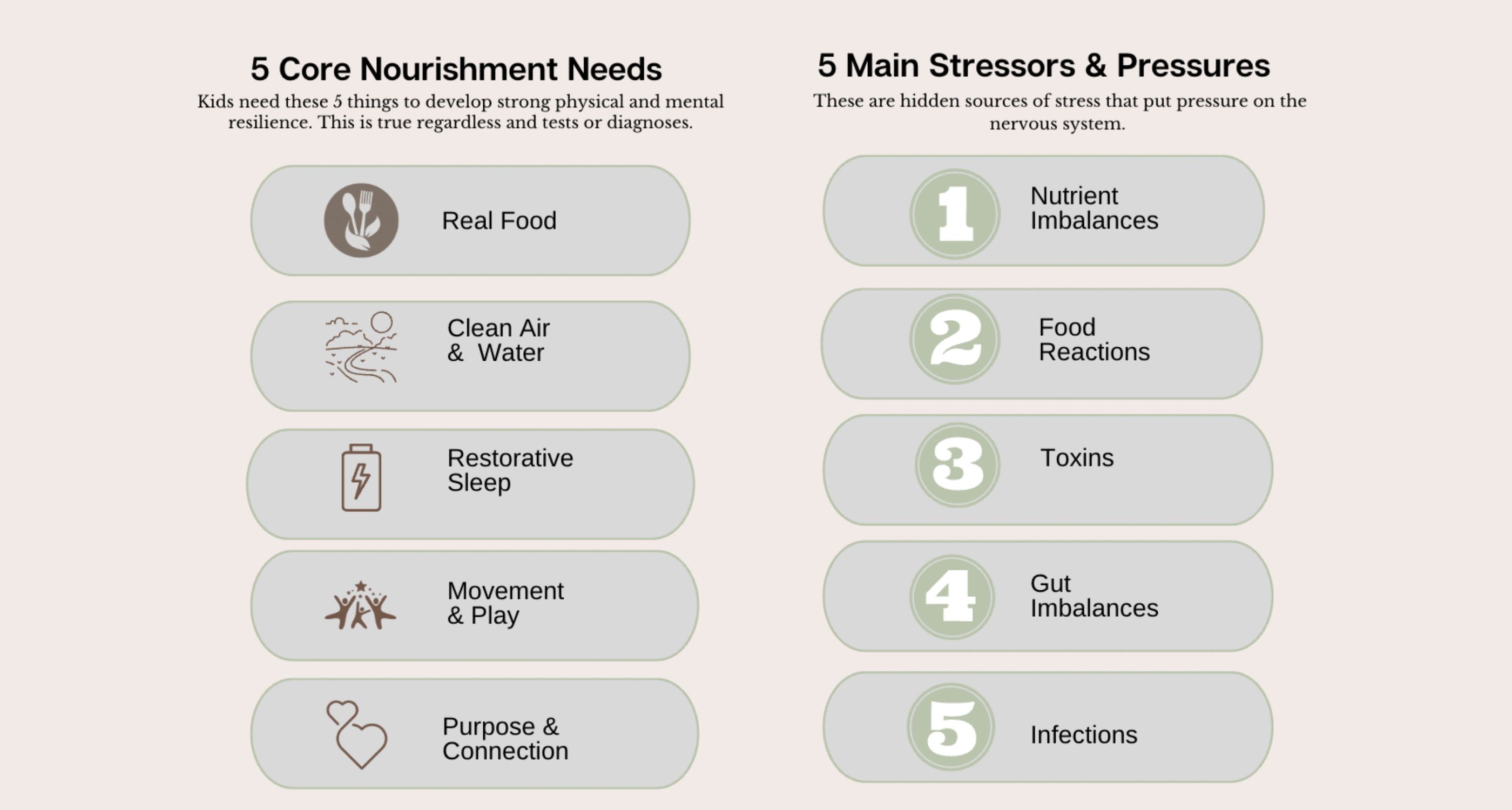How To Shift Your Kids From Stressed To Strength (even if they resist your efforts!)

When your child is anxious, angry, shut down, getting into trouble, struggling in school, or overwhelmed, it’s hard not to panic. You wonder if it’s a discipline problem, a parenting issue, something at school, or a diagnosis you’ve missed…
Do This First... an important reframe.
The first thing I do with parents is stop and reframe things.
When kids aren't doing well, the most powerful question we can ask is: “What’s making them feel so uncomfortable?”
Because here’s the truth: Kids do better when they feel better. And they feel better when their body and brain are working well.
This is a guiding principle in our work with kids.
Most of the time, there’s a reason they don’t feel good. Our job is to uncover what’s happening underneath the behavior, and then create a step-by-step plan to support your child’s nervous system, mood, and overall health.
Let me show you what this can look like.
>> Rather watch & listen than read? 🎥 Watch the free 13-minute Fast Class for parents hereIt outlines everything you need to know.
Behavior Is A Clue - Not The Problem Itself
Behavior is not just something to manage... it's communication. It’s your child’s way of saying, “Something doesn’t feel right. It’s a sign that the nervous system is overwhelmed.
Our job is to get curious about what's causing stress and create the right conditions for safety, balance, and support. That’s when the nervous system can calm down - and that's when kids can grow, learn, accept guidance, and feel better.
After working with families for decades, I’ve learned that without a framework for thinking about something, your head starts to spin from all the tactics out there.
So here’s the framework I use to help parents help their kids.
5 Nourishment Needs Support Brain & Body Health
There are five key things kids need to function well, physically, emotionally, and mentally.
Focusing on these is how you build a Culture of Nourishment in your home and it’s the first step toward stronger mental and physical health.
>> Prefer to listen or watch?
Here are the Nourishment Needs
1. Real Food
There’s nuance to getting the right nutrients into your child’s body, but to keep it simple: nutrients from real, whole food make the body run. Processed foods and additives can cause irritation.
2. Clean Air & Water
Air and water help move things through the body. They're critical. But they can also be sources of chemicals, molds, metals, and fragrances that disrupt health. Clean inputs matter.
3. Restorative Sleep
Without enough sleep, kids don’t grow well, detox properly, or regulate hormones. Even 30 extra minutes can improve focus, learning, and emotional control.
4. Movement, Laughter & Play
Movement supports physical and mental health. Laughter stimulates calm in the nervous system. Play helps kids regulate, build confidence, and connect. All are important.
5. Purpose & Connection
We’re wired for attachment. Connection with caring adults helps kids feel safe. It’s a critical and often overlooked piece of both mental and physical health. This one deserves its own post, but know this: go all-in on connection and you’ll see powerful shifts in your kids.
Simple, But Not Always Easy
It’s one thing to understand your child’s nourishment needs. It’s another to get them met when you’re tired, busy, or unsure where to begin.
When we work with families, we help them:
-
Stay focused on these core needs
-
Make practical changes that fit their life
-
Talk to their kids about nourishment in ways that don’t create conflict or stress
There’s a learning curve, yes. But now you have a framework. That’s a powerful first step.
So, what’s next?
Part 2: The Interfering Factors
🎧 Prefer to listen? Go to episode 26 on the podcast here
So what do you do when the basic nourishment needs are being met, but your child still struggles?
That’s when we look at five main stressors that throw a wrench in progress. We use Functional Tests to gather data so we know where to focus.
Here's what we consider in our Functional Assessments...
1. Nutrient Imbalance
Your child may be missing key nutrients due to poor intake, high demand, or poor absorption. Blood and urine tests can reveal imbalances.
2. Food Reactions
Sometimes food causes inflammation and disrupts nutrient availability. It’s often temporary. A food sensitivity test or elimination diet can help clarify things.
3. Toxin Accumulation
We all have detox systems, but some kids struggle more with clearing toxins. As these build up, they can impact brain function, contributing to symptoms like depression, anxiety, or ADHD. Urine tests can help us figure this out.
4. Gut Problems
The gut-brain connection is a two-way street. If the gut ecosystem is off, it can affect mood, learning, and immune response. A child-specific microbiome test (stool) can reveal what’s going on.
5. Infections & Immune Activation
For some kids, immune activity triggered by infections can affect the brain, leading to rage, poor sleep, anxiety, or mood instability. We can explore this using blood testing.
Just as there are 5 Nourishment Needs, there are 5 common stressors that interfere with health and resilience.
This framework helps us figure out where to look and what to do next.
Our Process - What It Looks Like
We use this framework to help you move forward, one manageable step at a time.
Step 1: We Listen & Assess
We take a detailed look at your child’s symptoms, history, and environment. When needed, we use functional testing to identify stress and imbalance.
Step 2: We Build A Plan
We create a personalized, step-by-step plan to meet your child’s nourishment needs and reduce the stressors. The goal is manageable, realistic change.
Step 3: We Support You As You Take Action
We coach you through implementation. We offer guidance, troubleshooting, and support, never leaving you alone to just figure it out.
“But My Kid Couldn't Care Less…”
We hear this more often than we'd like!
Your child isn’t interested in eating differently. They don’t want a new supplement. They’re not motivated by “feeling better.” They’re definitely not reading wellness blogs.
That’s okay. We don’t need your child to be fully on board from day one.
We start by looking at what’s going on and shifting what’s around your child: The food, routines, environment, the inputs.
We gather data and explain it to them in a kid-friendly way so they understand why we're proposing changes.
As your child starts to feel better, they become more open.
Change gets easier.
Don't assume anything... have a conversation with your child about whether they're interested in feeling better. Do this at a time when they are feeling secure and connected and calm. They may surprise you!
Why This Approach Works
Because we stop chasing symptoms and start supporting systems.
We work with the whole child, not just the diagnosis or the behavior. We look at what the body and brain need to function well.
If you're asking more questions than you have answers right now, that’s a good sign. Now you're asking the right questions. You’re thinking strategically.
This approach is especially helpful for:
-
Kids who’ve tried therapy or meds but still struggle
-
Families who feel like nothing’s working
-
Parents looking for a holistic, science-backed plan
-
Kids with anxiety, ADHD, sensory overload, or sleep issues
-
Families wanting to reduce reliance on medication
We help calm the chaos by restoring balance, step by step, system by system.
We blend biological needs with psychological insight, starting with the body, to ease the mind… and we find the child.
And when we work from the inside out like this, even small shifts can lead to big relief over time.

>> Ready to take the next step? Find out which stress factors are at play for your child - Click HERE for our complimentary assessment
Related Articles:
Microbiome Testing For Kids (video)
The Gut-Brain Connection: 3 things every parent needs to know
Amino acids for Relieving Stress
What's up with Moody Teens? About COMT
How to have positive conversations with people who don't agree with you
About Functional Assessments for Kids and Teens






